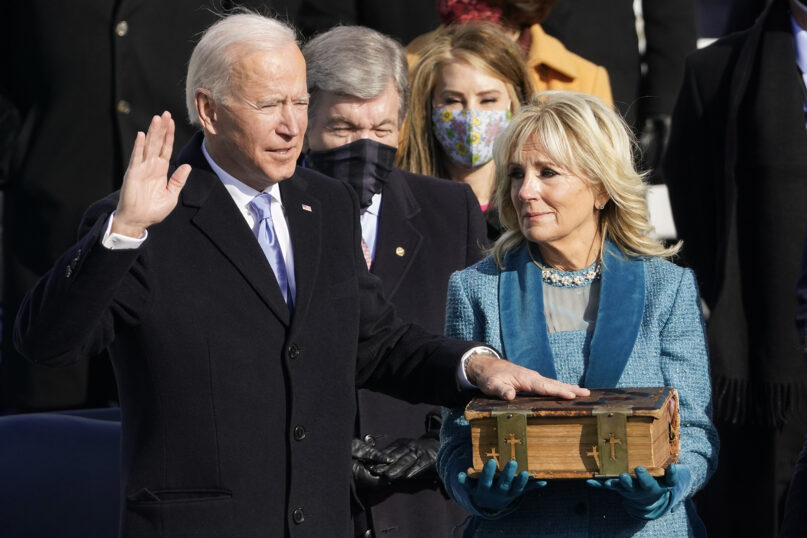(RNS) — An eventful year by any standard, 2021 had more than its share of religion headlines.
Even a casual reader might have had a hard time finding a major news story that didn’t have a religion imprint somewhere in it. That trip to space? Three hundred members of passenger Wally Funk’s church gathered to cheer her on via livestream. The wildly popular Netflix horror series? A very Catholic spin on the classic vampire tale.
But religion was more than a passing mention in 2021’s most significant news stories. Below, RNS’s coverage of the 10 most defining religion stories of the year.
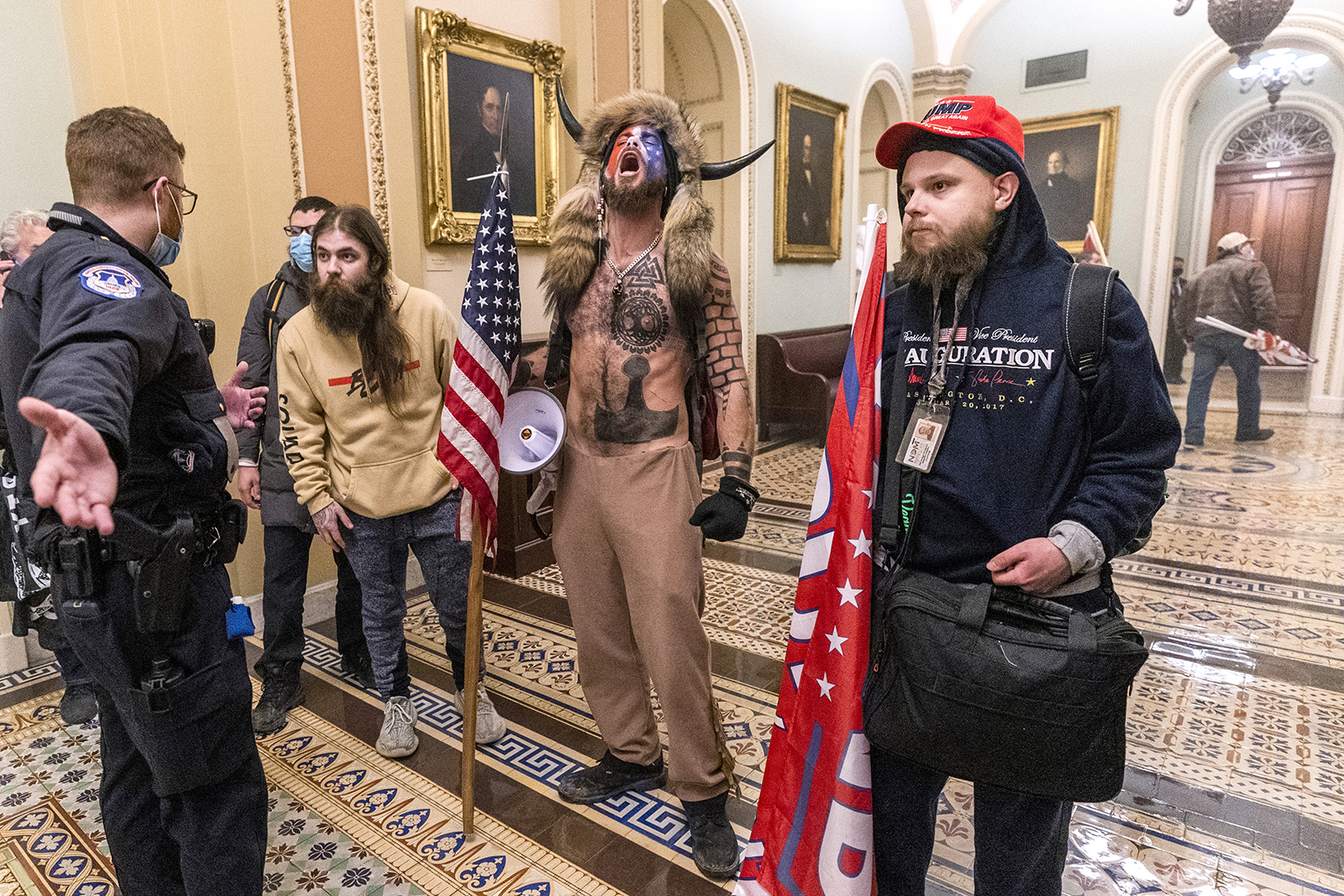
Jacob Chansley, center, better known as the “QAnon Shaman,” and other supporters of President Donald Trump are confronted by Capitol Police officers outside the Senate Chamber inside the Capitol, Jan. 6, 2021, in Washington. (AP Photo/Manuel Balce Ceneta)
Jan. 6 Capitol insurrection rallies Christian nationalists
The events of Jan. 6 dominated the news cycle from the beginning to the end of 2021. As a mob of supporters of President Donald Trump stormed the U.S. Capitol — many of them wearing overt Christian symbols — on Jan. 6, 2021, American religious leaders reacted quickly to a chaotic and unprecedented scene. Many called for prayer; some called for Trump’s impeachment; most condemned the violent mob.
In the ensuing months, more details from the day began to emerge: the House chaplain offering prayers and calm her first day on the job; the curious ecumenism of the insurrectionists as QAnon conspiracy theorists prayed alongside Proud Boys; the role of the internet and social media, as well as an alternate “Christian nationalist internet” in radicalizing many evangelicals who broke into the Capitol that day.
But Jan. 6 was only a beginning. An extreme form of nationalism — with Christianity often at its center — has made anti-vaccine mandates, opposition to critical race theory and support for gun rights its rallying cries.
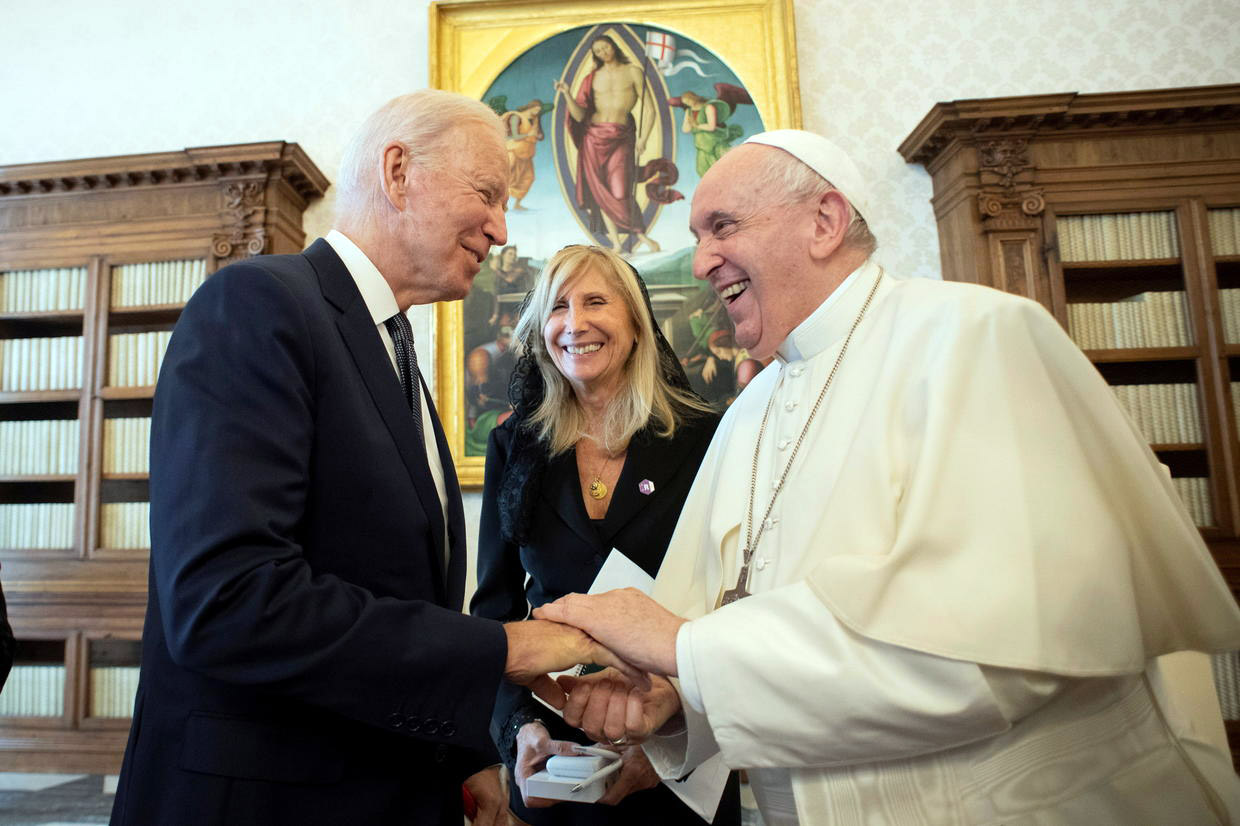
President Joe Biden, left, shakes hands with Pope Francis as they meet at the Vatican, Friday, Oct. 29, 2021. Photo by Vatican Media
Joe Biden’s first year as the second Catholic president brings tension with US bishops
Joe Biden is only the second Catholic to serve as U.S. president. But unlike the first, John F. Kennedy, Biden faced resistance from the increasingly conservative U.S. Conference of Catholic Bishops.
On Inauguration Day, as many other world leaders congratulated Biden, the bishops criticized him for supporting abortion rights, which is contrary to Catholic teaching. The relationship went downhill from there. At their June meeting, held online, the U.S. bishops voted to draft a document addressing the possibility that priests may refuse the Eucharist to Catholic politicians who support abortion rights.
But in late October, Biden visited with Pope Francis at the Vatican, discussing climate change and immigration, as well as the distribution of COVID-19 vaccines and health care for the poor. The meeting, coming a month after the pontiff said he has never denied the Eucharist to anyone, seemed to indicate Francis disagreed with the U.S. bishops. In November, the long-awaited bishops’ document on the Eucharist did not directly rebuke politicians for supporting abortion rights. It did, however, reaffirm their stance that Catholics who support abortion should refrain from partaking in Holy Communion.
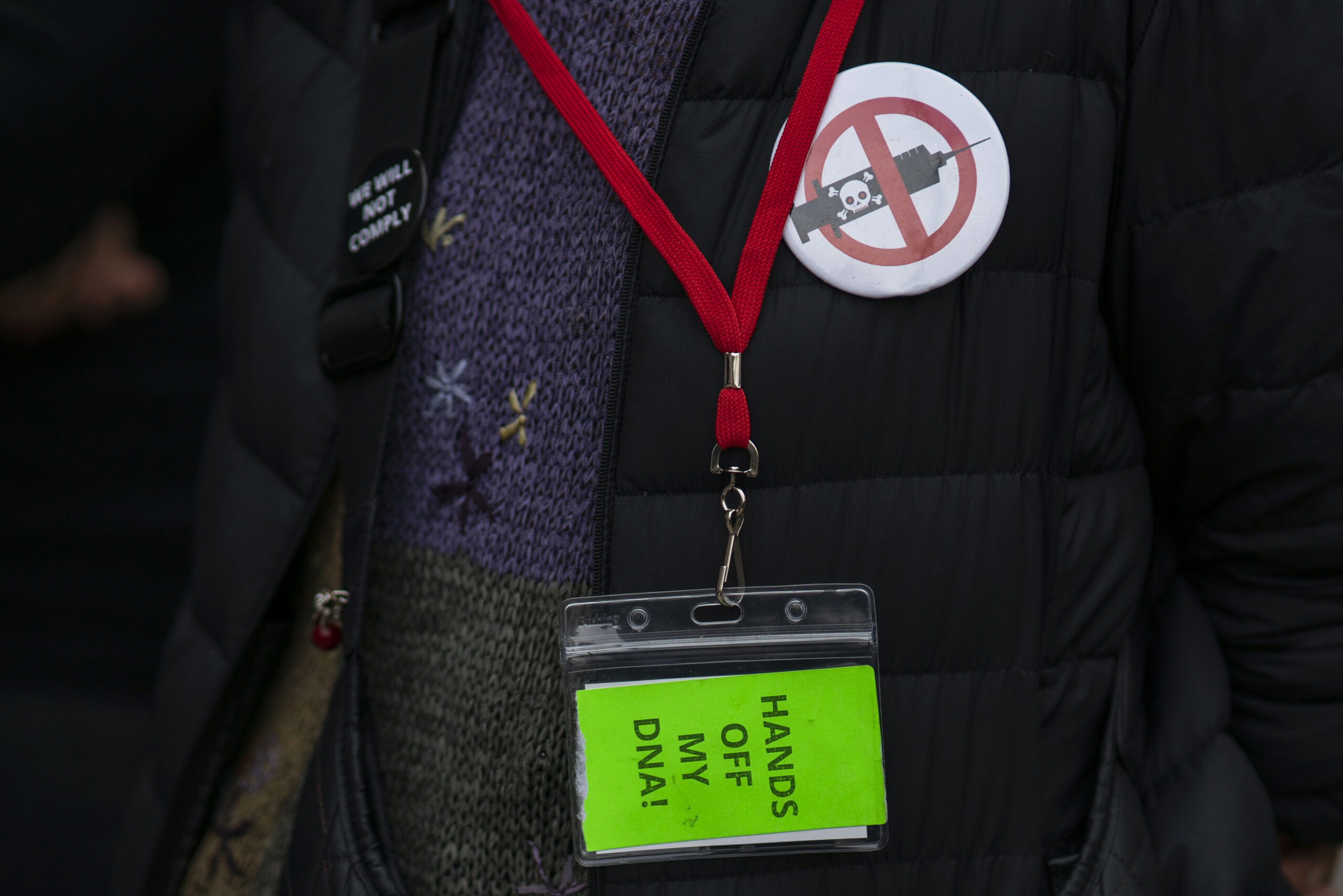
A woman wears an anti-vaccine pin while people and teachers pray as they protest against COVID-19 vaccine mandates outside the Manhattan Federal Court Tuesday, Oct. 12, 2021, in New York. (AP Photo/Eduardo Munoz Alvarez)
Amid vaccine rollout, religious exemption becomes battleground
In March, as the long-awaited COVID-19 vaccine began to make its way into the arms of people all over the world, Francis Collins, the National Institutes of Health director, joined religious leaders and medical professionals at the Washington National Cathedral to celebrate the vaccine rollout and to encourage vaccine acceptance.
“As a believer and a scientist, I can see the opportunity to use the tools of science as a chance to be part of God’s plan for healing,” said Collins, an evangelical Christian, at the event.
By September, a weary Collins told RNS he was “a bit” frustrated with his fellow evangelicals, a group multiple studies were revealing to be the most vaccine resistant and hesitant among religious Americans.
Studies also showed that faith leaders were a key part of overcoming vaccine hesitancy among their constituents. Though many prominent religious leaders came out in support of the vaccine — including the pope, the National Association of Evangelicals and leaders within the Southern Baptist Convention — the vaccine, for some Christians, was a political issue, and one leader was fired from his evangelical organization after voicing public support for the vaccine on a national television show.
Even as appeals for religious exemptions for the vaccine began to appear and anti-vaccine, anti-mask rhetoric took over local school board meetings and plenty of Christian message boards, vaccine resistance nationally has continued to decline.
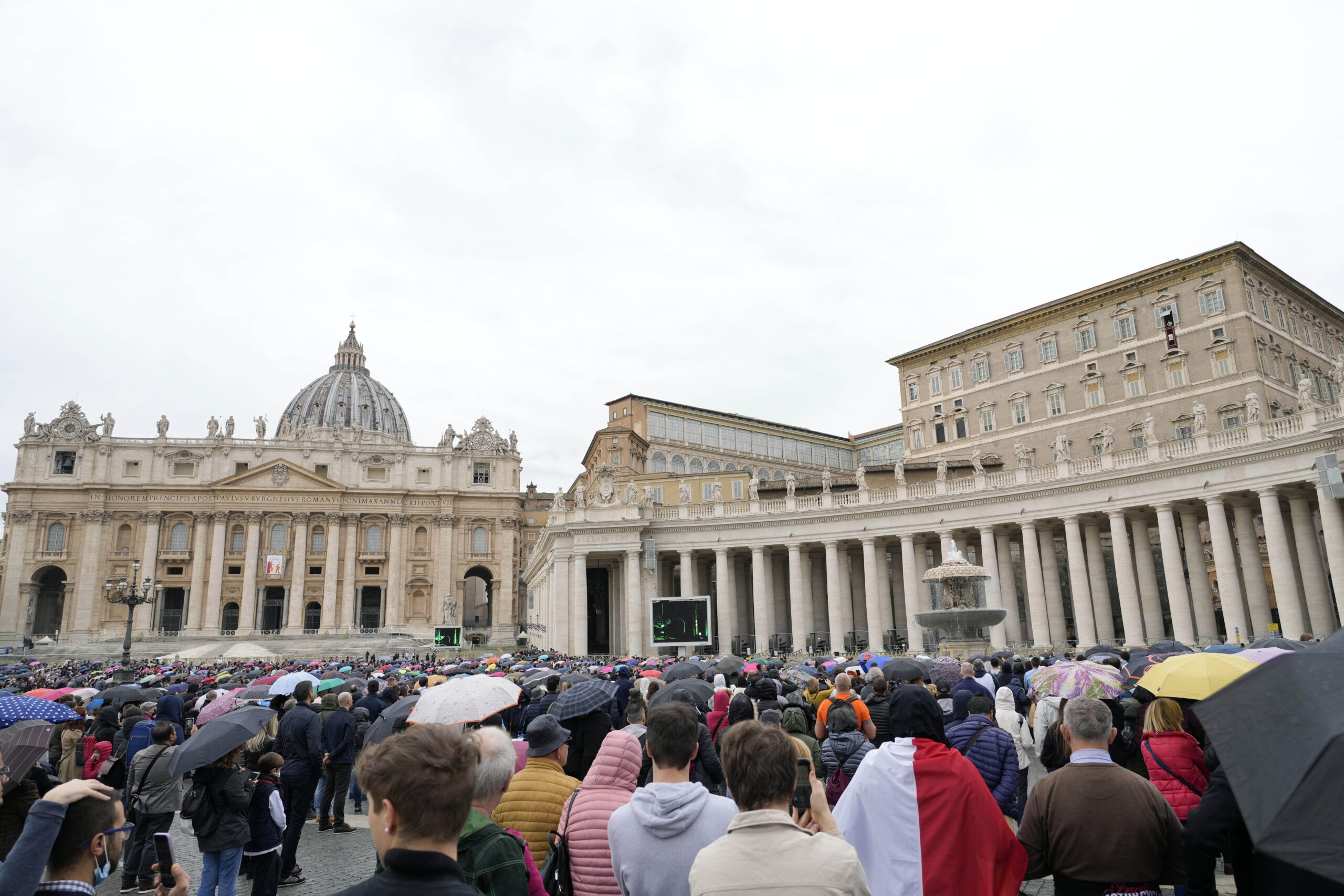
Faithful gather to listen to Pope Francis’ Angelus noon prayer in St. Peter’s Square, at the Vatican, Sunday, Nov. 14, 2021. The Vatican’s big fraud and embezzlement trial, which opened to great fanfare in July, suffered another delay Tuesday, Dec. 14, 2021, as the tribunal postponed any further decisions until prosecutors finish redoing their investigation for four of the original 10 defendants. (AP Photo/Gregorio Borgia, File)
The Vatican launches an unprecedented trial of top officials in efforts to squelch scandals surrounding its finances
In July — the same month the Administration of the Patrimony of the Holy See released a synthesis of its annual budget for the first time — the Vatican launched a megatrial with the indictment of 10 former officials, including Cardinal Angelo Becciu and several Vatican business partners, in connection with a controversial investment in property in London that depleted the church’s finances and undermined its credibility. The charges came two months after Francis issued a decree allowing cardinals to be tried by the Vatican’s tribunal.
Since the first pretrial hearing in July, Vatican prosecutors have struggled to stand up to the massive team of lawyers and attorneys presented by the 10 defendants, and questions on whether the Vatican court is equipped to handle such an ambitious financial trial have loomed over the proceedings.
The unprecedented trial has hit a number of roadblocks, as defense lawyers demanded to see the pope’s testimony and the Vatican prosecutor requested to withdraw all the material collected during the investigation and to start afresh with new interrogations.
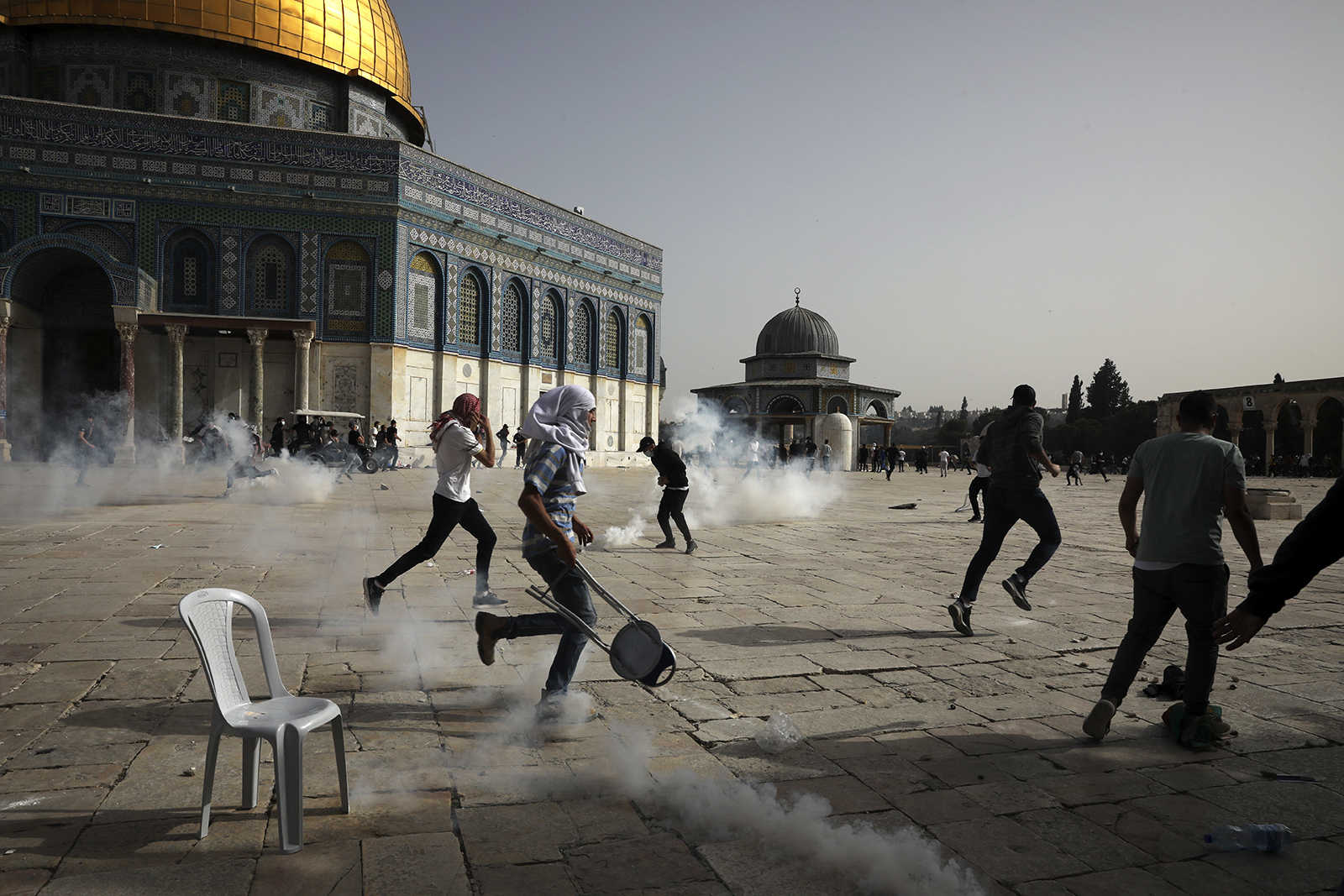
Palestinians run away from tear gas during clashes with Israeli security forces May 10, 2021, at the Al-Aqsa Mosque compound in Jerusalem’s Old City. (AP Photo/Mahmoud Illean)
The Israeli-Palestinian conflict has U.S. repercussions
The planned eviction of Palestinians from homes in East Jerusalem and clashes between Israeli police and Palestinian protesters at the Al-Aqsa Mosque, one of Islam’s holiest sites, touched off 11 days of violence in May, as Hamas fired thousands of rockets from Gaza toward Israel and Israel retaliated with airstrikes.
In the face of the violence that killed more than 200 Palestinians and 10 Israelis, younger U.S. Jews began openly questioning their relationship to Israel and Zionism and voicing support for Palestinian rights.
Younger evangelicals also appeared willing to turn away from support for Israel, according to a 2021 poll, suggesting deepening generational divides and a growing ambivalence on backing Israel.
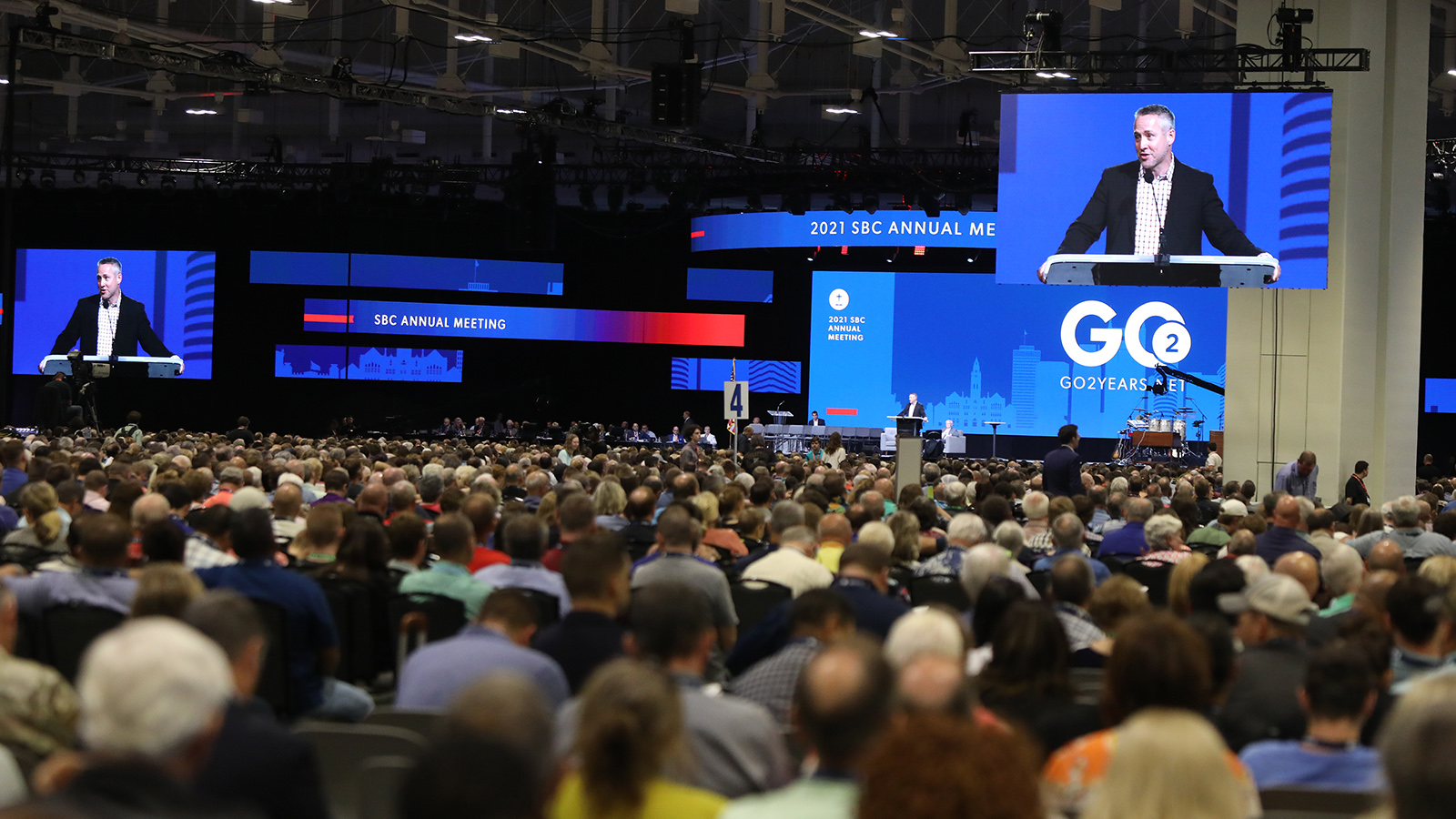
Southern Baptist Convention President J.D. Greear is projected on screens around the Music City Center while addressing the annual meeting, Wednesday, June 16, 2021, in Nashville. RNS photo by Kit Doyle
The Southern Baptist Convention annual gathering draws massive crowds as the denomination faces high-profile exits and bitter internal divides
On March 5, popular Bible teacher Beth Moore told Religion News Service she is “no longer a Southern Baptist,” citing support for Trump, racism and a lack of action against sex abuse as reasons for her departure.
So began a tumultuous year within the country’s largest Protestant denomination.
In May, Russell Moore (no relation), the president of the SBC’s Ethics & Religious Liberty Commission, resigned his position and took a post with Christianity Today. Weeks later, two of his letters were leaked in advance of the SBC’s annual convention, revealing his growing alienation from fellow SBC leaders over race and sexual abuse issues.
Their exits came on the heels of several high-profile Black SBC pastors who withdrew from the convention in 2020 after debates over critical race theory and accusations of racism within the SBC’s ranks.
As a result, the stakes were high going into the annual convention in Nashville in June. The fraught meetings drew more than 17,000 people and highlighted the bitter divides within the denomination — divides that seemed to the wider, watching public a proxy for the country’s partisan cultural flashpoints.
In the end, the SBC narrowly elected Ed Litton as president, a surprise candidate dedicated to racial reconciliation, besting the Conservative Baptist Network’s candidate, Mike Stone. The convention also approved an abuse task force to oversee an investigation into the handling of sexual abuse allegations and avoided an adoption of any resolutions specifically decrying critical race theory.
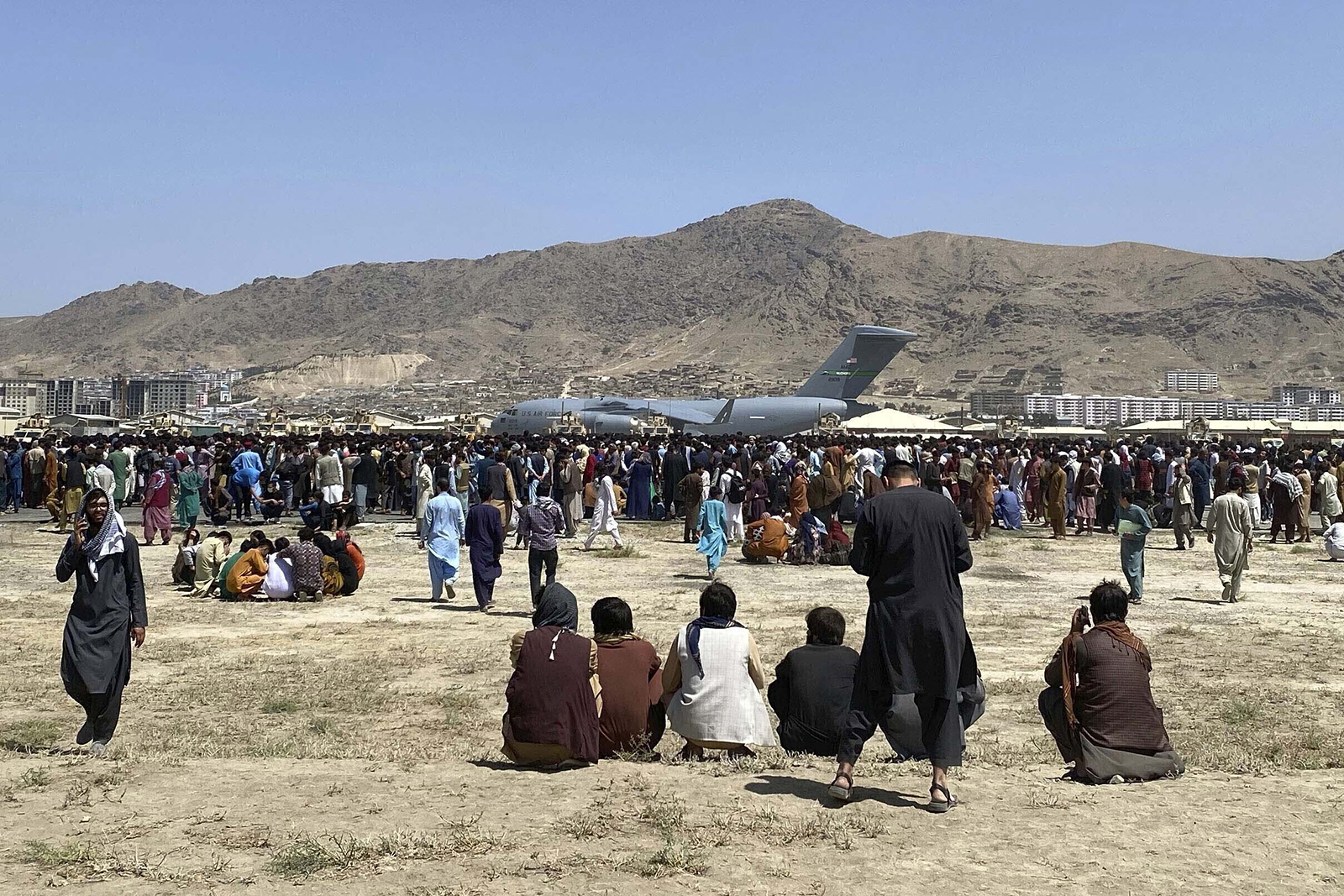
In this Aug. 16, 2021, file photo, hundreds of people gather near a U.S. Air Force C-17 transport plane along the perimeter at the international airport in Kabul, Afghanistan. After the Taliban takeover, employees of the collapsed government, civil society activists and women are among the at-risk Afghans who have gone into hiding or are staying off the streets. They hope for a way to leave their homeland. (AP Photo/Shekib Rahmani, File)
Taliban takeover of Afghanistan leads to influx of refugees as resettlement agencies scramble to rebuild
In mid-August, Taliban insurgents seized control of Afghanistan, capturing the capital city of Kabul (and a storied painting), just three months after American forces began their withdrawal from the besieged country.
In the aftermath, faith-based resettlement groups, themselves gutted from cuts to the refugee program under the Trump administration, worked quickly to try to secure passage for Afghan allies, even as they criticized the Biden administration for not evacuating them sooner.
As Biden authorized new funds for Afghan refugees, a group of former U.S. presidents and various religious leaders launched an organization to aid Afghan evacuees.
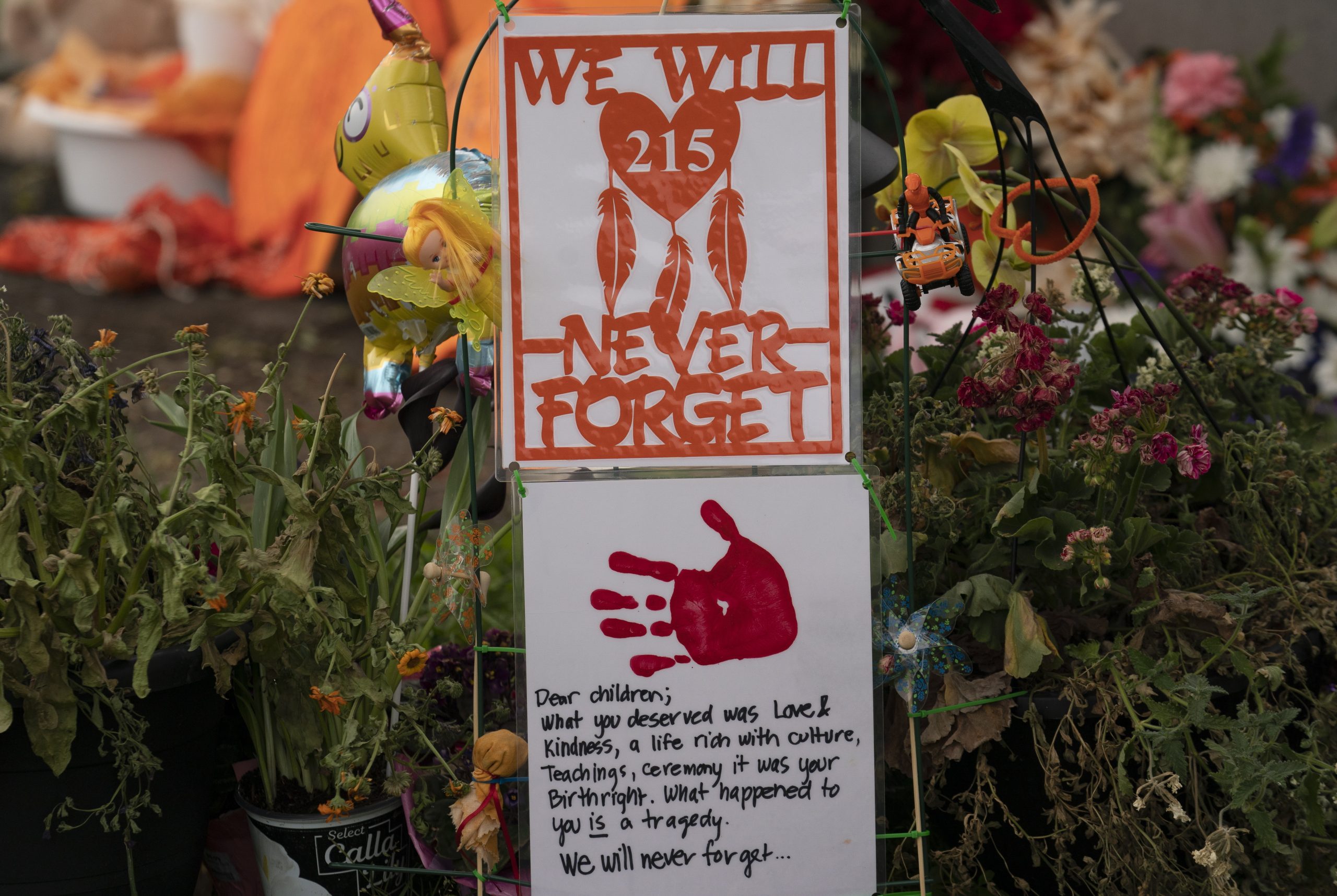
A memorial is seen outside the former Residential School in Kamloops, British Columbia, Sunday, June 13, 2021. The remains of 215 children were discovered buried near the former Kamloops Indian Residential School earlier in June. (Jonathan Hayward/The Canadian Press via AP)
Discoveries of hundreds of buried bodies prompts a reckoning among religious groups who operated Indigenous boarding schools
In June, the remains of more than 750 mostly Indigenous children were found at the site of a former Indigenous boarding school in the province of Saskatchewan in Canada. Weeks before, more than 200 bodies were similarly discovered buried on the grounds of another Canadian boarding school.
The discoveries renewed calls for both Canada and the U.S. — which had twice as many boarding schools as its northern neighbor — to reckon with the brutal history of the Indigenous boarding schools, many of them run by religious institutions.
In late September, Catholic and Protestant groups voiced their support as U.S. Senator Elizabeth Warren and the co-chairs of the Congressional Native American Caucus, U.S. Reps. Sharice Davids and Tom Cole, reintroduced the Truth and Healing Commission on Indian Boarding School Policies in the United States Act.
The same day, several U.S. mainline denominations — including the Episcopal Church, the Evangelical Lutheran Church in America and the United Methodist Church — encouraged their members to observe a day of remembrance for U.S. Indian boarding schools.
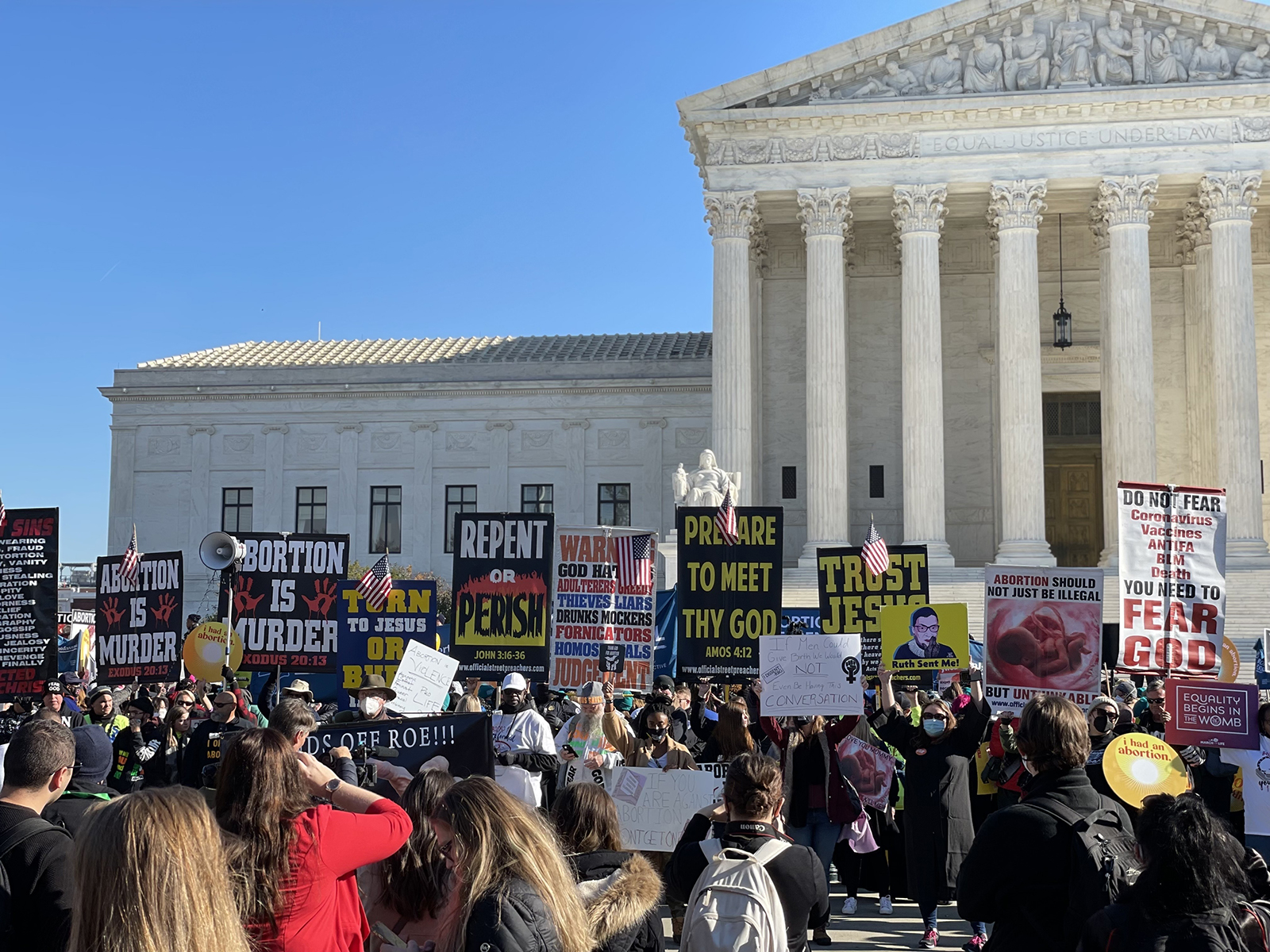
Supporters and opponents of abortion rights demonstrate outside the U.S. Supreme Court, Dec. 1, 2021, in Washington. RNS photo by Jack Jenkins
As Supreme Court hears abortion case, clergy take sides
In December, the Supreme Court heard a case involving a challenge to a Mississippi law prohibiting most abortions after the 15th week of pregnancy. The case, Dobbs v. Jackson Women’s Health, directly challenges Roe v. Wade, the landmark 1973 ruling that granted women the right to an abortion. The ruling is expected in 2022.
The court also refused to block a new Texas law that bans abortion after six weeks, a law that resulted in lawsuits from a number of clergy. Two dozen Texas congregations publicly declared their support for women to decide whether and when to have children, calling themselves Reproductive Freedom Congregations.
Meanwhile, some rabbis said they would defy the Texas law, if necessary, and continue to counsel women to have an abortion under some circumstances. And the National Council of Jewish Women started “Rabbis for Repro,” saying they believe it should be legal in most, if not all, cases.
Conservative Christian groups such as the Southern Baptist Convention’s Ethics and Religious Liberty Commission praised the Mississippi and Texas laws as progress for the larger anti-abortion movement.
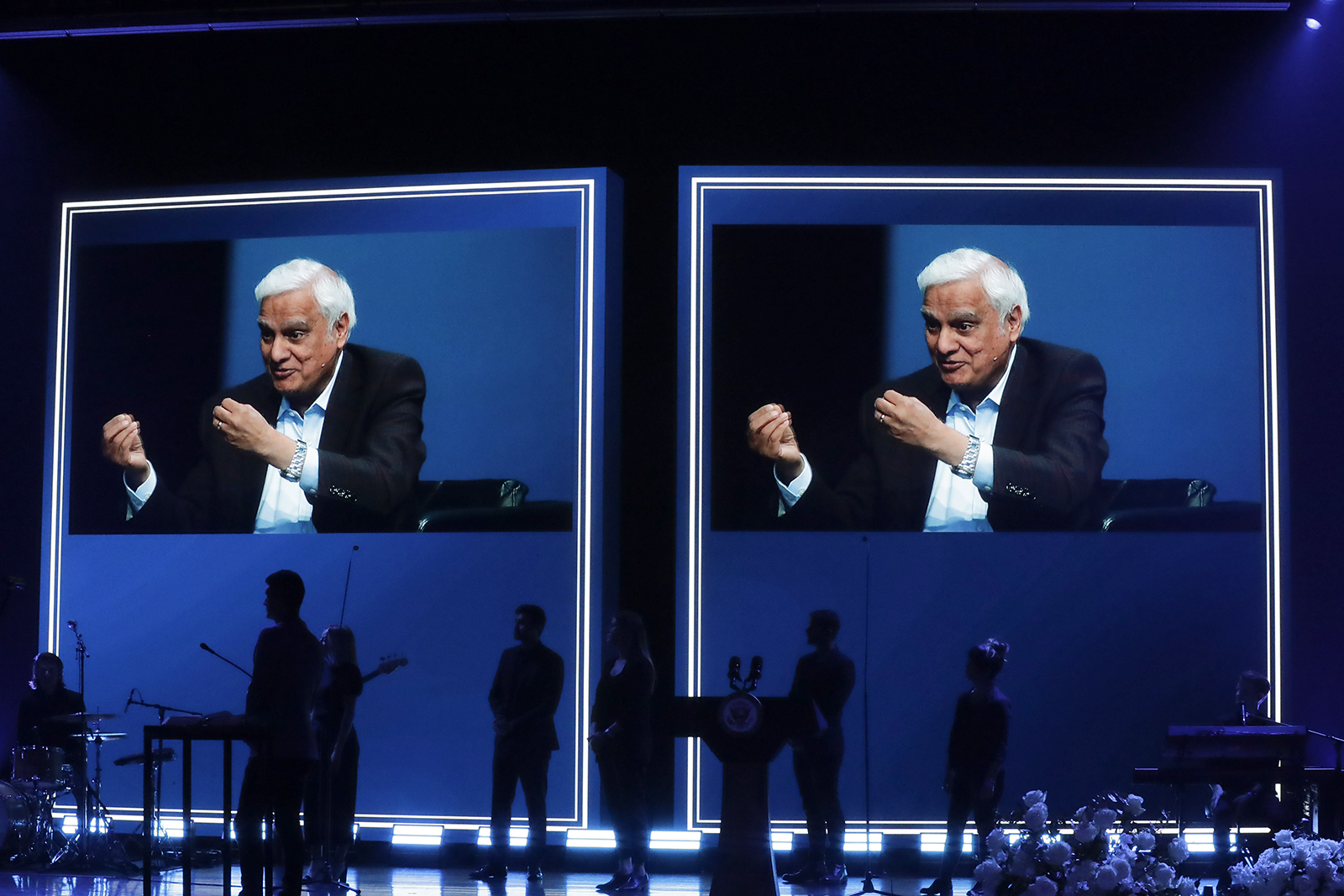
In this May 29, 2020, file photo, images of Ravi Zacharias are displayed in the Passion City Church during a memorial service for him in Atlanta. A posthumous sex scandal involving Zacharias, who founded the Ravi Zacharias International Ministries, has placed the global organization in a wrenching predicament. (AP Photo/Brynn Anderson, File)
Disgraced religious leaders face accusations of sexual assault, abusive leadership, coverups and patterns of corrupt behavior
“Clergy behaving badly” stories were in no short supply in 2021. Here’s a list of the more egregious offenses in this year’s unholy headlines:
-
-
- Ravi Zacharias posthumously defrocked, ministry suspends fundraising after abuse report
- Former employee sues Dave Ramsey’s company for alleged religious discrimination, ‘cult-like’ atmosphere
- Exclusive: Sex abuse allegations by Carl Lentz’s former nanny put spotlight on Hillsong culture
- As Muslim Advocates founder resigns, former staffers allege hostile workplace
- Staccato Powell, disrobed as AME Zion bishop: pioneer or swindler?
- Hillsong founder, Brian Houston, charged with concealing child sex offenses to plead not guilty
- Pastor who approved of marital rape removed from Seventh-day Adventist Church
- 4 women sue Orthodox Union and its youth group, alleging sex abuse by rabbi
- Bruxy Cavey, pastor of one of Canada’s largest churches, accused of sexual misconduct
-
